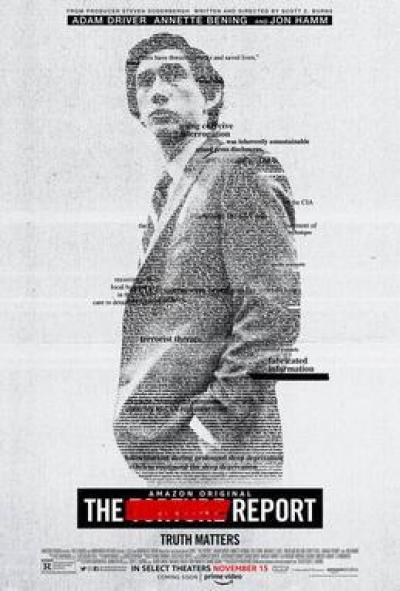'The Report' is a much-needed reminder of why faith leaders continue to speak out against torture

In my years as a pastor in the Washington, DC, area, I had many parishioners who worked in the military and other sectors of government. On a few occasions, individuals came to see me, in secret and in confidence, to tell me dark secrets, things they did, things they were ashamed of, actions that they were ordered to do but that still weighed heavy on their consciences because they were illegal.
Those experiences helped prepare me for The Report, a powerful new film starring Adam Driver as a Senate Intelligence Committee staffer and Annette Bening as Senator Dianne Feinstein (who was just nominated for a Golden Globe for her role). Even so, the film, based on true events, shook me in ways that few films have, providing a window into the hidden workings of both government and human nature.
I was one of the early clergy voices that came together in the National Religious Campaign Against Torture (http://www.nrcat.org/) in 2006, after the horrific Abu Ghraib incident. I felt then, as I do now, that my Christian faith condemns torture. The story of the crucifixion teaches me that God is identified, not with those who torture, but with the victims of torture. To condone torture, to minimize it, to cover it up, is, simply put, to hate God.
“The United States does not torture. It’s against our laws and it’s against our values.” That’s what President George W. Bush said to the United Nations shortly before the Abu Ghraib incident became public. According to the film, government officials kept the torture program a secret even from the President, and if not for the courageous work of a Senate staffer, Daniel J. Jones (played by Adam Driver in the film), along with courageous senators like Dianne Feinstein, Sheldon Whitehouse, John McCain, and others, the program and its cover-up would still be unknown.
In fact, if not for the diligent work of Senate staff, our government, acting on our behalf, could still be doing what is “against our laws and against our values,” carrying on horrific enhanced interrogation techniques that were, in addition to being morally despicable, proven to be not only ineffective but often, downright counterproductive.
In the five years since the Senate report on torture was released, the CIA and FBI have been in the news for a wide variety of reasons, but The Report reminds us about why it is so important that voters have the facts to, through their elected officials, hold government agencies accountable. For motives that seem so unquestionably good, such as protecting American lives, even good people can find themselves doing hellish things.
Near the end of the film, Sen. John McCain, himself a victim of torture, is captured on TV saying, “This question isn’t about our enemies. It’s about us. It’s about who we were, who we are, and who we aspire to be.”
The Report is worth seeing, not only because it is powerfully acted and movingly told, but also because it will help us all steel our wills to never again become what we were in those years when, having been a victim of horrific violence, our nation became a perpetrator.
I'm glad the critically-acclaimed The Report is increasing awareness of torture. I think back to those parishioners who came to me and confessed the actions they had taken against their conscience. Beyond just awareness though, I pray for the day when no American government official is ordered to violate human rights. But I'm not just praying or waiting for that day to come. I'm continuing to work with the National Religious Campaign Against Torture to advance the cause of human dignity and rights.
Brian D. McLaren is an author, speaker, activist, and public theologian.




























